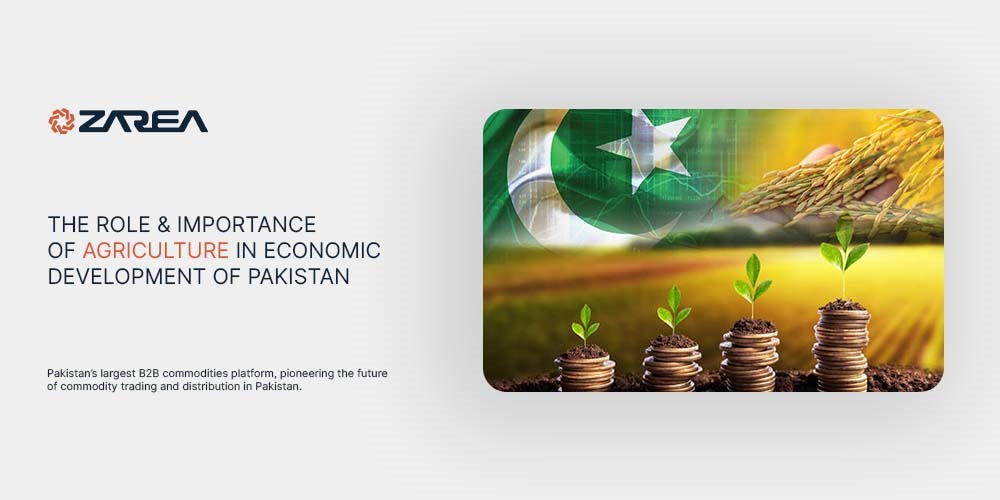Introduction – Importance of Agriculture in Economic Development:
“Agriculture is the process of preparing land or soil for the purpose of production.” You will estimate the importance of agriculture by this, it’s the backbone of Pakistan and plays a crucial role in the economic development of Pakistan. 50% of the labour of Pakistan is a part of agriculture. Overall it contributes 24% to Pakistan’s GDP. So, around 70% of the population of Pakistan is directly or indirectly connected to agriculture. Pakistan’s hugely overgrowing population totally depends on the agriculture sector. This sector supplies food and raw materials for the industries and textiles as well. Furthermore, agriculture serves as a crucial source of foreign exchange income via exports, particularly rice, cotton, and fruit etc.
Agriculture in Pakistan is a varied and active sector that holds significant importance for the nation’s economy, society, and environment. The growth and advancement of this sector can provide major advantages for the nation and its citizens. Agriculture sector serves in food security, economic development, environmental sustainability, and conservation of cultural heritage.
Major Key Factors and importance of Agriculture in the Economic Development of Pakistan:
Source of Employment:
As we all know, Pakistan is a developing economy in which basic employment has significant importance. Meanwhile, agriculture is a worthy sector for Pakistan as it definitely provides employment for its people. As a source of employment agriculture provides jobs for millions of people whether they belong to rural or urban areas. In order to reduce poverty and unemployment this sector’s employees whether they are skilled or not they contribute to Pakistan’s economic growth.
Food Security: Maintaining the Country:
Agriculture plays a crucial role in providing food security by generating vital staples that nourish millions. By providing adequate amounts of crops and livestock goods, the sector aids in fighting hunger and decreasing malnutrition, promoting a healthier populace.
Export Earnings and Foreign Exchange:
Pakistan’s varied agro-climatic regions enable the cultivation of export-standard crops such as rice, cotton, fruits, and vegetables, all of which are highly sought after globally. These exports represent an important source of foreign currency, promoting economic stability.
Economic Stability for Farmers:
For numerous farmers, farming acts as a reliable source of revenue. Government assistance via subsidies, credit options, and incentives enhances this sector, alleviating rural poverty and promoting economic development.
Livestock: A Growing Subsector and Nutritional Contributions:
The livestock sector is an essential component of Pakistan’s farming environment. Being the third-largest milk producer in the world, the nation gains advantages from income creation and job opportunities via livestock farming. This subsector possesses significant potential for value enhancement and increased export revenues.
Agriculture is essential in tackling malnutrition by generating a diverse range of crops and livestock products. The industry guarantees access to a nutritious diet, assisting in addressing health issues associated with inadequate nutrition.
Water Management for Sustaining Resources:
Being the top user of water, agriculture depends on effective water management to maintain sustainability. Methods such as drip irrigation, rainwater collection, and water-saving programs are crucial for enhancing output while conserving water supplies.
Agro-Based Industries: Driving Growth:
Agriculture underpins vital sectors such as textiles, sugar, and vegetable oil manufacturing. These sectors, driven by plentiful raw materials and low labor costs, draw considerable investment, bolstering Pakistan’s industrial foundation.
Rural Development and Biodiversity Conservation:
The advancement of rural regions is closely linked to agricultural growth. Enhanced infrastructure, healthcare, and education are inherent benefits of a flourishing agricultural sector, elevating rural communities.
Farmers are crucial for maintaining traditional crop types and animal breeds, protecting Pakistan’s abundant biodiversity. This dedication to agrobiodiversity aids in environmental sustainability and enhances the resilience of agricultural systems.
importance of agriculture in pakistan’s economy:
Pakistan imports more petroleum products than it exports, and the depreciation of the rupee against the dollar has resulted in increased prices for both petrol and diesel, widely relied upon by the general public.
Attracting Foreign Investment:
The importance of agriculture in industry has emerged as a focal point for international investment, especially in sectors such as seed production, horticulture, and animal husbandry. This surge of funds boosts technological progress and international competitiveness.
The rate of population growth in Pakistan is rising swiftly. As per the UNDP human development report, the population growth rate in Pakistan stands at 2% annually. Thus, as the population grows quickly, the demand for food is also rising swiftly. In this regard, agriculture is the primary sector that is fulfilling the growing demand for food. It also decreases the import of food from other countries. Thus, we can assert that the agriculture sector plays a crucial role in Pakistan’s development by supplying food for the large population and contributing to economic growth.
Food Processing and Value Addition:
With significant capacity for food processing, the industry can convert raw agricultural goods into more valuable products. This generates fresh employment prospects, raises agricultural earnings, and enhances the quality and safety of food.
Renewable Energy Production – Research and Development:
Agriculture plays a role in renewable energy, especially through sugarcane by-products such as bagasse, which is utilized for electricity production. This collaboration enhances Pakistan’s energy composition and minimizes dependence on non-renewable sources.
Pakistan’s robust agricultural research framework, featuring top institutes and universities, fuels innovation. Funding for research produces better crop varieties, advanced technologies, and sustainable agricultural practices.
Climate Adaptation and Resilience:
Agriculture faces threats from climate change, but it also offers solutions for adaptation. Methods such as crop diversification, agroforestry, and sustainable water management can help reduce the impacts of droughts, floods, and temperature changes.
Sustainable Development and Cultural Heritage:
Through the implementation of organic farming and conservation agriculture, Pakistan’s agricultural sector can establish harmony among economic development, environmental safeguarding, and social welfare, aiding in the fulfillment of the UN’s Sustainable Development Goals (SDGs).
Importance of agriculture is profoundly embedded in Pakistan’s customs and celebrations, showcasing the country’s vibrant cultural legacy. It continues to be a point of pride and identity for numerous communities.
Regional Cooperation:
The sector additionally enhances regional integration, as cross-border trade in agricultural products encourages economic connections and stability with surrounding nations.
Final Thoughts to Conclude:
Agriculture in Pakistan is not merely a sector; it serves as a vital foundation for the country’s economy, society, and environment. Its roles in food security, rural advancement, export revenue, and climate resilience highlight its essential significance. With ongoing government assistance and sustainable methods, the agricultural sector and Zarea can reveal unparalleled opportunities, creating a path for a strong and thriving future for Pakistan.
FAQ’s:
How is it important to agriculture?
Were you aware? Agriculture has the ability to change lives! By increasing food output, enhancing incomes, and providing food security, it can elevate the 80% of the global poor residing in rural regions who rely on farming.
Each seed we plant signifies not only crop cultivation but also the growth of hope, chances, and a more promising future!
What is the economic importance of Pakistan?
Pakistan – A Textile Powerhouse in Asia:
Did you know?
Pakistan stands out as the 8th biggest textile exporter in Asia, intricately connecting to worldwide markets! This industry drives the economy, adding 8.5% to GDP and offering employment to an impressive 40% of the industrial labor force.
Positioned as the 4th largest cotton producer and having the 3rd largest spinning capacity in Asia, Pakistan’s textile sector combines tradition with innovation, weaving a robust foundation for economic advancement!
Which 5 crops are most important?
From fertile lands to thriving farms, Pakistan’s agriculture reflects its rich culture! Here’s a glimpse of the crops that energize this dynamic nation:
- Rice & Wheat – Essential foods that nourish countless lives
- Millets & Pulses – Healthy and adaptable
- Tea & Coffee – Globally acclaimed beverages
- Sugarcane – The sugary essence of India
- Oil Seeds – Crucial for culinary uses and more
- Cotton and Jute – Creating fabrics and sustainable goods
- Pakistan’s land genuinely produces plenty, nourishing its citizens and the globe.
Why is Pakistan so important?
Pakistan proudly stands as a middle power nation, housing the world’s 6th-largest active military forces. Additionally, this resilient country is recognized as a nuclear-weapons state, highlighting its strategic capabilities.
In terms of its economy, Pakistan is gaining attention among emerging and leading growth economies, driven by a substantial and quickly growing middle class. With resilience, aspiration, and resolve, Pakistan is establishing its position on the world stage!

































